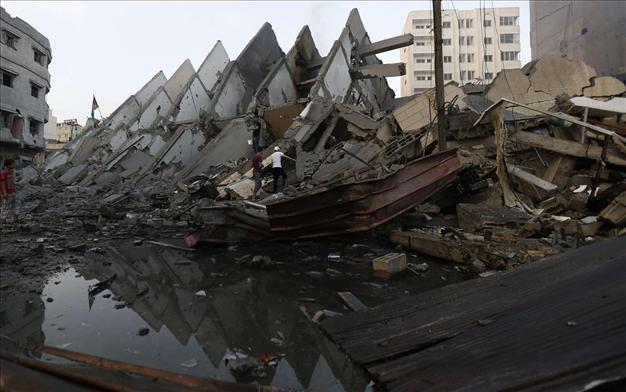Long-term Gaza truce agreed with Israel: Palestinians
GAZA/JERUSALEM

Palestinian residents inspect the remains of Al-Basha, a building that was destroyed by an Israeli air strike in Gaza City on Aug. 26. AFP Photo / Mohammed Abed
The Palestinians have reached agreement with Israel on a "permanent" truce for Gaza, a senior official told AFP on Tuesday, in a move Hamas hailed as a "victory."There was no immediate comment from Israel on the claimed deal to end seven weeks of deadly conflict in and around the territory.
The Palestinian official gave no time for when a ceasefire would take effect but said president Mahmud Abbas would give further details in a speech from his West Bank headquarters at 1600 GMT.
"The contacts that have been going on have led to a permanent ceasefire, a (deal to) end the blockade and a guarantee that Gaza's demands and needs will be met," the official told AFP, speaking on condition of anonymity.
The Islamist Hamas movement, de facto ruler of Gaza and party to the Abbas-led efforts to agree a truce, also said a deal had been struck with Israel.
"The negotiations ended with an agreement which embodies the resistance of our people and a victory for the resistance," its exiled deputy leader Mussa Abu Marzuk wrote on his Facebook page.
The Palestinian official told AFP the truce deal had been finalised after 48 hours of intensive shuttle diplomacy by Azzam al-Ahmed, head of the Palestinian delegation to the protracted, on-off truce talks.
"Over the past 48 hours, he has been shuttling between the leadership of Hamas, Islamic Jihad, all the factions, and Egyptian leaders, travelling between Ramallah, Gaza, Doha overseas," he said.
In Gaza, Hamas spokesman Sami Abu Zuhri said Egypt was expected to make an official announcement od the deal.
Air strikes kill six
On the battlefront, Israeli warplanes kept up their pressure on Hamas with air strikes killing six and raids hitting two high-rise apartment blocks in Gaza City, leaving 40 people wounded.
In the first strike, warplanes fired at least six rockets at a 16-storey complex in the Nasser neighbourhood, in which there were 60 apartments and a commercial complex, completely destroying the building and wounding 25.
But no-one was killed after the army warned residents to leave in a pre-recorded message, a witness told AFP. "The army told them to leave immediately and they all ran out into the street to find shelter," he said.
Warplanes then fired on the 14-storey Al-Basha building in Rimal neighbourhood, causing massive damage and wounding 15, witnesses and medics said.
The Israeli army acknowledged hitting buildings serving as "Hamas command and control centres" as well as two schools in central and northern Gaza from which "low-trajectory fire" had been directed at Israel.
In an Arabic-language text message sent to residents' mobile phones after the strikes, the army said the towers were hit because they were "used by Hamas for military purposes" and warned that the battle would continue.
Hamas spokesman Fawzi Barhum denounced the bombardment of the two towers as "a war crime aimed at terrorising the people".
The group's armed wing confirmed firing on Tel Aviv and Haifa in response, although the army said nothing had hit further north than Ashkelon, where a rocket hit a bungalow causing major damage and wounding 21.
Yuval Cohen, owner of the house, said the family was sleeping when the air raid sirens sounded, saying it was a miracle they had not been killed.
"We were in our bedroom when the alarm started. We ran to the children's room to wake them and while we were running with the kids, the rocket exploded in the bedroom," he told AFP. "Luckily, we escaped by a miracle. We didn't even make it to the shelter.
"We don't sleep at nights, we don't sleep during the days, we don't rest at all. Everybody says 'it won't happen to me' but in the end, it did."
Since midnight, 69 rockets have been fired at Israel, 61 of which struck the south while another six were intercepted, the army said.
"The goal of the fighting isn't to finish off every last launcher, the goal is to convince the other side to say 'enough'," a senior Israeli military official told Haaretz newspaper, saying Hamas was quite close to that point.
Political officials also believe most of the Islamist movement is looking for a quick end to the conflict, particularly after three of its senior military commanders were killed in a targeted assassination last week.
"The targeted killings have created a situation in the last week in which Hamas wants a ceasefire," said Science Minister Yaakov Peri, an observer in the eight-member security cabinet.
"The man who is digging in his heels... is Khaled Meshaal," he said, referring to the movement's exiled leader who is based in Doha.
Haaretz's military correspondent Amos Harel said Meshaal was "the last obstacle on the way to declaring a ceasefire," noting that the assassinations had bolstered his position in relation to the movement's Gaza-based leaders.
Meanwhile, Abbas was to convene a meeting of his leadership in the West Bank city of Ramallah later Tuesday, officials said.
Although Israeli officials have refused to comment on the Egyptian truce proposal, army radio said Prime Minister Benjamin Netanyahu had been locked in discussions late into the night with the defence minister and the chief of staff.
A Palestinian official told AFP on Monday that the proposal would involve the easing of restrictions at border crossings into the battered enclave and allow for the delivery of aid and reconstruction materials.
"The disputed points will be discussed in a month," he told AFP, saying they were waiting for Israel's response.
















